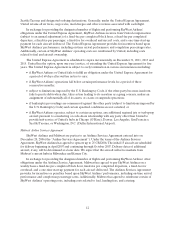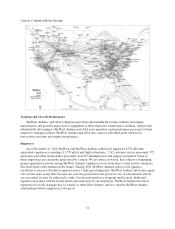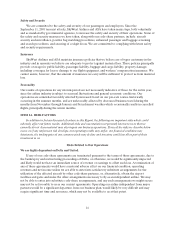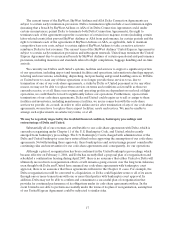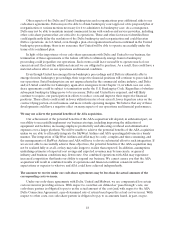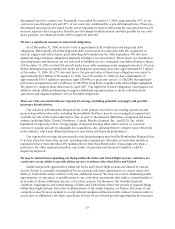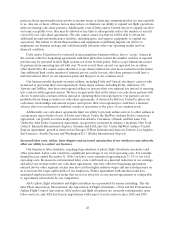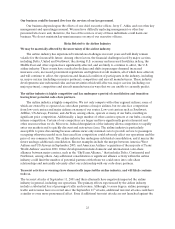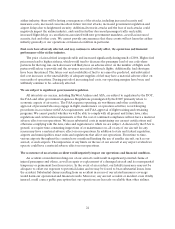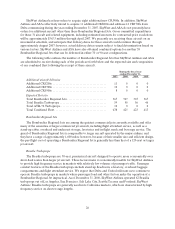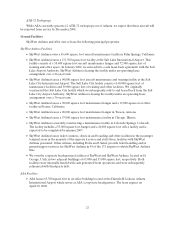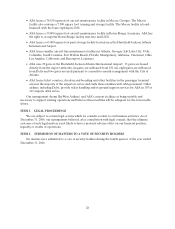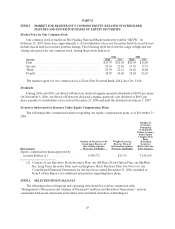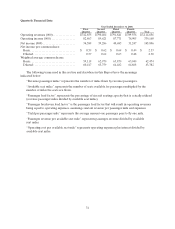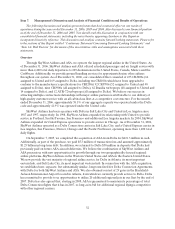SkyWest Airlines 2006 Annual Report Download - page 28
Download and view the complete annual report
Please find page 28 of the 2006 SkyWest Airlines annual report below. You can navigate through the pages in the report by either clicking on the pages listed below, or by using the keyword search tool below to find specific information within the annual report.22
prohibiting the use of Bombardier aircraft types we operate wouldhave a material adverse effect on our
business and operations.
Maintenance costs will likely increase as the age of our regional jetfleet increases.
Because the average age of ourCRJ900s, CRJ700s and CRJ200s is approximately 0.3, 2.1 and 5.1
years, respectively, our regional jet fleet requires less maintenance now than it will in the future. We have
incurred relatively low maintenance expenses on our regional jet fleet because most of theparts on our
regional jet aircraft are under multi-year warranties andalimited number of heavy airframe checks and
engine overhauls have occurred. Our maintenance costs will increase significantly, both on an absolute
basis and as a percentage of our operating expenses, as our fleet ages and these warranties expire. Under
our United Express Agreement, specific amounts are included in the current rates for future maintenance
on CRJ200 engines used in our United Express operations. The actual cost of maintenance on CRJ200
engines may vary from the estimatedrates.
If we incurproblems with any of our third-party service providers, our operations couldbe adversely
affected.
Our reliance upon others to provide essential services on behalf of our operations may limit ourability
to control the efficiency and timeliness of contract services. We have entered into agreements with
contractors to providevarious facilities and services required for our operations, including fuelsupply and
delivery, aircraft maintenance, services andground facilities, and expect to enter into additionalsimilar
agreements in the future. Theseagreementsare subject to terminationafter notice. Any material problems
with the efficiency and timeliness of our automatedor contract servicescouldhaveamaterial adverse
effect on our business, financial condition andresults of operations.
Interruptions or disruptions in service at one of our hub airports, due to adverse weatheror for any other
reason, couldhave a material adverse impact on ouroperations.
We currently operate primarily through hubs in Atlanta, Los Angeles, San Francisco, Salt LakeCity,
Chicago,Denver, Cincinnati/Northern Kentucky and the Pacific Northwest.Nearly all of our flightswill
either originateorfly into one of thesehubs. Our revenues depend primarily on ourcompletionof flights
and secondarily on service factors such as timeliness of departure and arrival. Any interruptions or
disruptions could, therefore, severely and adversely affect us. Extremeweather can cause flight disruptions,
and during periods of storms or adverse weather, fog, lowtemperatures,etc.,our flightsmay be canceled
or significantly delayed. HurricanesKatrina and Rita, in particular, caused severe disruptionto air travel in
theaffected areas and adversely affected airlinesoperating in the region, including ASA. We operate a
significant numberof flights to and from airports with particular weather difficulties, includingAtlanta,
Salt Lake City, Chicagoand Denver. Asignificant interruption or disruption in service at one of our hubs,
dueto adverse weather or otherwise, could result in thecancellation or delay of a significant portion of our
flights and, as a result, could have a severe impact on our business, operations and financial performance.
Fluctuations in interest rates couldadversely affectour liquidity, operating expenses and results.
Asubstantial portion of ourindebtednessbears interest at fluctuating interest rates. These are
primarily based on the London interbank offered rate for deposits of U.S. dollars, or LIBOR. LIBOR
tends to fluctuate based on general economic conditions,generalinterest rates, federal reserve rates and
thesupply of anddemand forcreditin the London interbank market. We have nothedged ourinterest
rate exposure and, accordingly, our interest expense for anyparticular period may fluctuate based on
LIBOR andothervariable interest rates. To the extent theseinterest rates increase, ourinterestexpense
will increase,in which event, we mayhave difficulty making interest payments and fundingour other fixed
costs and our available cash flow for generalcorporate requirements may be adversely affected.


